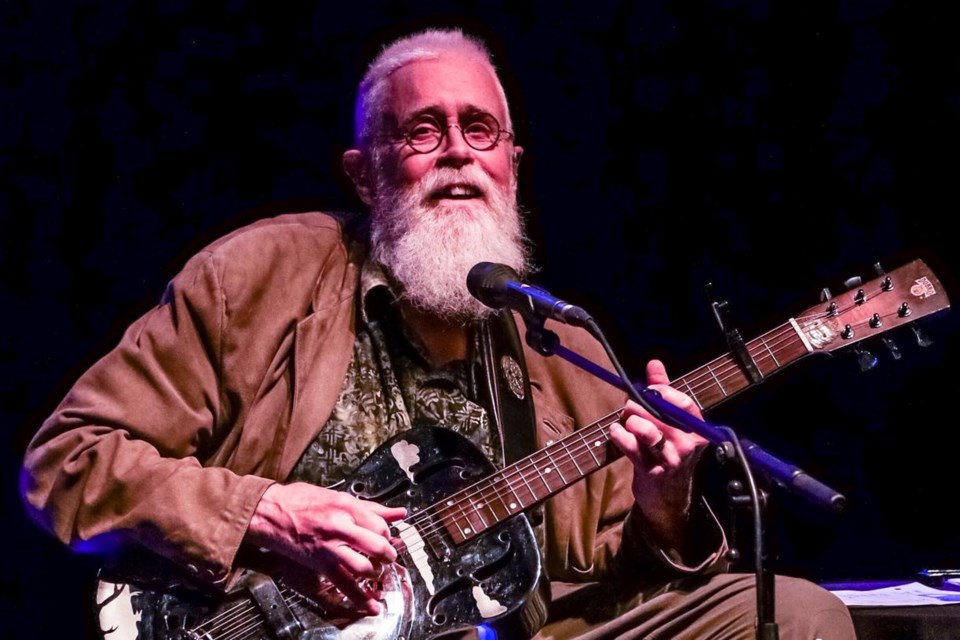Fans who cheered when they should have been horrified by the final line of Bruce Cockburn's If I Had a Rocket Launcher helped persuade the Canadian Music Hall of Famer to drop the 1984 hit from his playlist.
A lot of those misguided fans were Americans, the 13-time Juno winner told a group of Saultites gathered at the Sault Ste. Marie Museum.
Can an artist be responsible if others misinterpret his work, twist it into something it was never intended to be?
"I think the artist has some degree of responsibility," Cockburn said during a live-streamed question-and-answer session hosted over the weekend as part of a book launch by M. D. (Mark) Dunn, the Sault-based musician and author of You Get Bigger as You Go: Bruce Cockburn's Influence and Evolution.
Of 350 songs on Cockburn's 34 albums, two made Billboard's Hot 100, America's premier singles chart for all genres.
They were Wondering where the Lions Are, which reached #21 during its 17 weeks on the Hot 100 in 1980, and Rocket Launcher, which peaked at #88 in February 1985.
Rocket Launcher was recorded by Cockburn after an Oxfam-sponsored trip to Mexico, Chile and Nicaragua.
On Mexico's border with Guatemala, he visited Guatemalan refugee camps that were strafed almost daily by Guatemalan military helicopters, killing both adult and child refugees.
Writing the song later in a Mexican hotel room, fueled by whiskey and frustration, he toyed with thoughts of somehow taking matters into his own hands.
What might he do if he had a rocket launcher?
The first verse ends: "I'd make somebody pay."
The second verse ends: "I would retaliate."
The third verse: "I would not hesitate."
The fourth verse closes controversially: "If I had a rocket launcher, some son-of-a-bitch would die."
"The results frightened him," Dunn says in his book.
"He recounts crying while he wrote the song, and later worried that it would be seen as a call to violence. He debated whether the song should be released at all, in the end deciding against withholding it."
In a 2017 interview with The Globe and Mail, Cockburn expressed surprise that the song got any radio airplay.
"I almost didn't record it. I was afraid it would be misconstrued. There were other songs about Central America on the album, Stealing Fire. I didn't want people to think that I just wrote the song because I thought they should go down and kill Guatemalan soldiers.
"But there were enough people who understood it that I felt okay to having done it."
Some Canadian broadcasters, however, played an edited version of the track that omitted the "son-of-a-bitch" line.
In his livestream to Sault Ste. Marie, Cockburn said it's been a couple of years since he sang If I had a Rocket Launcher.
"I don't regret the song or anything like that. But the song is an expression of the feelings I had at a particular place and time."
"And what I find in the current climate – and this started a few years ago especially in the U.S, – is there's just too much of a tendency for people to cheer the last line of the song: 'Some son-of-a-bitch would die.'
"People should be shocked and horrified by that, not cheering it. And I'm not willing to play into that sentiment.
"The last time I played it, we were sitting in Chicago a couple of years ago. And the audience there, mostly responded with the appropriate feelings.... at least there was no cheering."
"It's not about killing people. It's about people being killed and the feelings that that would result from that. It's not an exhortation to go out there and blow away Guatemalan soldiers. Or, the current political climate, Russian soldiers or Hamas or whoever it is. It's a cry for, actually, for the whole song."
